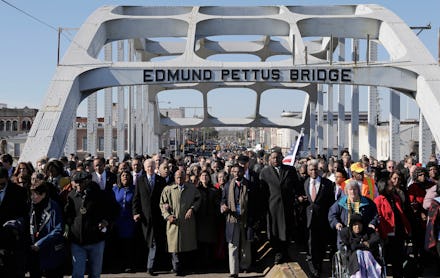It's Time To Remove This KKK Leader's Name From the Selma Bridge

Reclaiming black history means taking back its pieces, from Ferguson to Selma. Fifty years after the legendary Selma-to-Montgomery marches that led to the passage of the Voting Rights Act, a group of students and civil rights activists are doing just that.
The group Students UNITE has launched a Change.org petition to change the name of the Edmund Pettus Bridge — the site of 1965's Bloody Sunday events, during which policemen viciously attacked peaceful demonstrators on their first attempt to march from Selma to Montgomery to protest the continued violation of their voting rights throughout the American South.
The bridge was named after Alabama Senator Edmund Pettus, a Confederate general and, more disturbingly, a Grand Dragon of the state's Ku Klux Klan chapter. Now nearly 60,000 signatures strong, the petition demonstrates the belief of many that the name of this historic site should reflect its important place in civil rights history — not its racist past.
"There is something wrong with the idea that hundreds of African Americans, ones who have grown up in Selma and went to Selma's segregated public schools, pass the name of a KKK leader every single day," Students UNITE Executive Director John Gainey told Mic. "We have no desire to erase history, but there are some parts of our country's past that should not be celebrated or honored."
The history: On March 7, 1965, Alabama police, led by County Sheriff Jim Clark, and state troopers clashed with approximately 600 civil rights demonstrators on the Edmund Pettus Bridge. Though the protest was peaceful, police attacked demonstrators with clubs and tear gas. Images of the brutal violence were circulated on the news and helped spur support for the Selma Voting Rights Campaign as well as for the Civil Rights movement more broadly; later that year, demonstrators made it not only to Montgomery but all the way to Washington, D.C., where President Lyndon Johnson signed the Voting Rights Act into law on Aug. 6, 1965.
"We have no desire to erase history, but there are some parts of our country's past that should not be celebrated or honored."
The perfect time: Gainey observed that the confluence of events from Selma to Ferguson have created an apex of attention to racial tensions in America at this moment — making now the perfect time for the long-overdue historical revision. "We cannot ignore the past, and we also cannot ignore the present circumstances that we live in," he said. "The moment we turn a blind eye to what our fellow man and woman experience in this country, we say that their injustice is less important than our desire to remain silent."
Reclaiming history means renaming its markers. If support for the petition is any indication, people are done being silent. Those who signed elaborated on the significance of the name change in the comments. Jessica Allen from Selma wrote, "I'm signing because I believe the bridge's name should represent what it stands for not what it stands against." Lee Farnsworth, also from Selma, agreed, contending that the bridge should have a "name that represents the courage and integrity of the freedom fighters who were beaten on this very bridge."
The current name, Selma resident Kylie Jones wrote, "does not represent Selma, the beginning of the Voting Rights Movement and a catalyst for the passage of the Voting Rights Act of 1965. We have the power to change the name from a KKK Grand Dragon leader to something positive and hopeful! #SelmaIsNOW"
"We are doing this for the people of Selma today," Gainey said. Indeed, it's important to remember, as Common and John Legend asserted in their Oscars acceptance speech for their song "Glory" from the film Selma, that #SelmaIsNow. "This bridge was built on hope," Common said in the speech. "Welded with compassion. And elevated by love for all human beings." Selma is forever ensconced in the annals of American history as a memorial of the past and a beacon for the future. Let's help its name reflect that hope, love and compassion it truly represents.